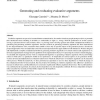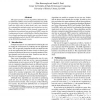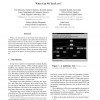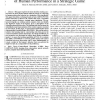1660 search results - page 104 / 332 » A Behavior Model for Next Generation Test Systems |
WWW
2005
ACM
15 years 10 months ago
2005
ACM
We offer the first large-scale analysis of Web traffic based on network flow data. Using data collected on the Internet2 network, we constructed a weighted bipartite clientserver ...
100
click to vote
AI
2006
Springer
14 years 10 months ago
2006
Springer
Evaluative arguments are pervasive in natural human communication. In countless situations people attempt to advise or persuade their interlocutors that something is desirable (vs...
ICCAD
1998
IEEE
15 years 2 months ago
1998
IEEE
This paper presents two new algorithms, Redundant Vector Elimination(RVE) and Essential Fault Reduction (EFR), for generating compact test sets for combinational circuits under th...
METRICS
2003
IEEE
15 years 3 months ago
2003
IEEE
When it is impractical to rigorously assess all parts of complex systems, test engineers use defect detectors to focus their limited resources. In this article, we define some pr...
103
click to vote
TSMC
2008
14 years 8 months ago
2008
This paper explores the issues faced in creating a sys-4 tem that can learn tactical human behavior merely by observing5 a human perform the behavior in a simulation. More specific...




